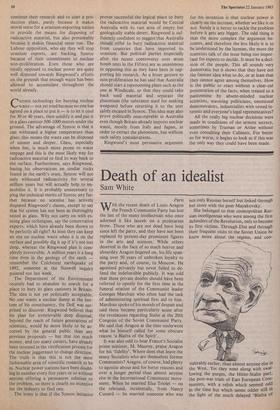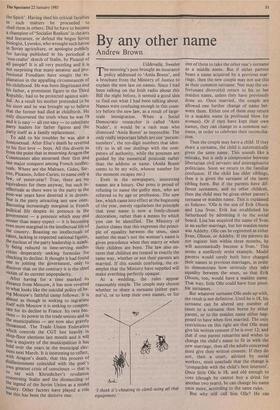Death of an idealist
Sam White
Paris With the recent death of Louis Aragon the French Communist Party has lost the last of the many intellectuals who once adorned it like laurels on a proletarian brow. Those who are not dead have long since left the party, and they have not been replaced by present-day prominent figures in the arts and sciences. While others deserted in the face of so much horror and absurdity Aragon lingered on, his life span- ning over 50 years of unbroken loyalty to the party and, of course, to Moscow. He agonised privately but never failed, to de- fend the indefensible publicly. It was odd that these private doubts should have been referred to openly for the first time in the funeral oration of the Communist leader Georges Marchais who often had the task of administering spiritual first aid to him. Marchais spoke of his moods of despair and said these became particularly acute after the revelations regarding Stalin at the 20th Congress of the Soviet Communist Party. He said that Aragon at the time underwent what he himself called for some obscure reason 'a Biafra of the Spirit'.
It was also odd to hear France's Socialist prime minister, M. Mauroy, praise Aragon for his 'fidelity'. Where does that leave the many Socialists who are themselves former Communists? Aragon, of course, had plenty to agonise about and for better reasons and over a longer period than almost anyone else in the International Communist move- ment. When he married Elsa Triolet — on the rebound, incidentally, from Nancy Cunard — he married someone who was
not only Russian herself but linked through her sister with the poet Mayakovsky.
She belonged to that cosmopolitan Rus- sian intelligentsia who were among the first defenders of the Revolution, only to become its first victims. Through Elsa and through their frequent visits to the Soviet Union he knew more about the regime, and con-
siderably earlier, than almost anyone else in the West. Yet they went along with swal- lowing the purges, the Hitler-Stalin pact, the post-war trials of East European Com- munists, with a relish which seemed odd at the time but which seems odder still in the light of the much delayed 'Biafra of the Spirit'. Having shed his critical faculties in such matters he proceeded to shed them in others. Did he have to become a champion of 'Socialist Realism' in the arts and literature, or defend the bogus Soviet biologist, Lysenko, who wrought such havoc in Soviet agriculture, or apologise publicly for having published in his periodical a 'non-realist' sketch of Stalin, by Picasso of all people? It is all very puzzling and it is not surprising that many amateur and pro- fessional Freudians have sought the ex- planation in the appalling circumstances of his childhood. He was born illegitimate and his father, a prominent figure in the Third Republic, had to be protected against scan- dal. As a result his mother pretended to be his sister and he was brought up to believe that the former had died at childbirth. He only discovered the truth when he was 19 and it is easy — all too easy — to substitute party leaders for father figures and the party itself as a family replacement.
To add to his troubles he was also a homosexual. After Elsa's death he reverted to his first love — boys. All this diverts us from the point that in mourning Aragon the Communists also mourned their first and last major conquest among French intellec- tuals. Where are the Malraux, Gides, Sar- tres, Picassos, Joliot-Curies, to name only a few, of yester-year? True, there are no equivalents for them anyway, but such in- tellectuals as there were in the party in the Post-war years have deserted it in droves. Nor is the party attracting any new ones. Becoming increasingly marginal in French Political life despite its presence in the government — a presence which may end sooner than many expect — it is becoming even more marginal in the intellectual life of the country. Boasting no intellectuals of talent, lacking in respected national figures, the nucleus of the party leadership is steadi- 1Y being reduced to time-serving medio- crities desperately seeking formulas for checking its decline. It thought it had found one in joining the government, only to discover that on the contrary it is the chief victim of its current unpopularity. After having for a time marked its distance from Moscow, it has now reverted !0 what looks like the suicidal policy of be- ing Moscow's faithful camp follower. It is almost as though in seeking to ingratiate itself with Moscow it is seeking to compen- sate for its decline in France. Its twin bas- tions — its power in the trade unions and in the municipalities — are now also gravely threatened. The Trade Union Federation which controls the CGT lost heavily in shop-floor elections last month and it will lose a majority of the municipalities it has held over the years in the municipal elec- tions next March. It is interesting to reflect, with Aragon's death, that this process of disillusionment coincided with the poet's Own greatest crisis of conscience — that is to say with Khrushchev's revelation Concerning Stalin and the dismantling of the legend of the Soviet Union as a model society. Other factors have played a role but this has been the decisive one.







































 Previous page
Previous page